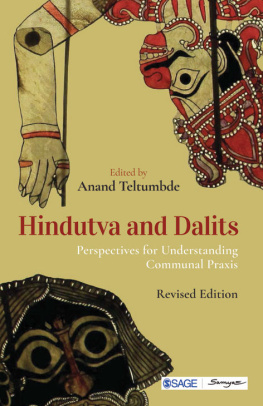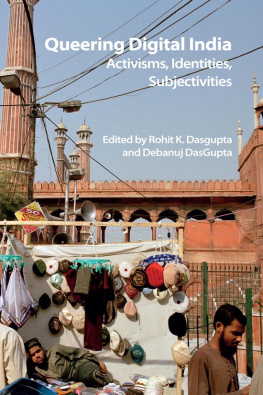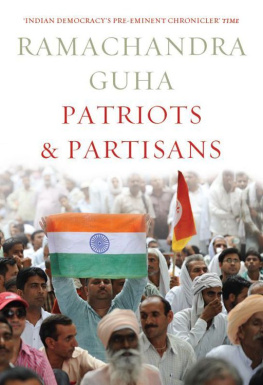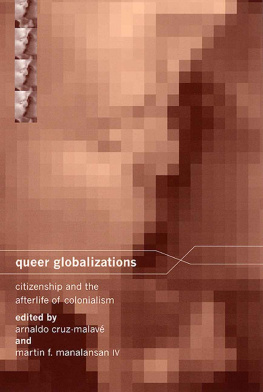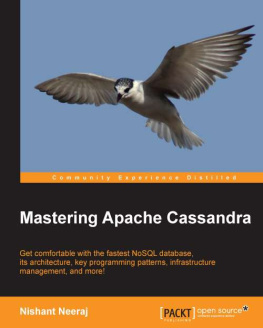Nishant Shahani - Pink Revolutions: Globalization, Hindutva, and Queer Triangles in Contemporary India
Here you can read online Nishant Shahani - Pink Revolutions: Globalization, Hindutva, and Queer Triangles in Contemporary India full text of the book (entire story) in english for free. Download pdf and epub, get meaning, cover and reviews about this ebook. year: 2021, publisher: Chicago Distribution Center (CDC Presses), genre: Politics. Description of the work, (preface) as well as reviews are available. Best literature library LitArk.com created for fans of good reading and offers a wide selection of genres:
Romance novel
Science fiction
Adventure
Detective
Science
History
Home and family
Prose
Art
Politics
Computer
Non-fiction
Religion
Business
Children
Humor
Choose a favorite category and find really read worthwhile books. Enjoy immersion in the world of imagination, feel the emotions of the characters or learn something new for yourself, make an fascinating discovery.

- Book:Pink Revolutions: Globalization, Hindutva, and Queer Triangles in Contemporary India
- Author:
- Publisher:Chicago Distribution Center (CDC Presses)
- Genre:
- Year:2021
- Rating:5 / 5
- Favourites:Add to favourites
- Your mark:
- 100
- 1
- 2
- 3
- 4
- 5
Pink Revolutions: Globalization, Hindutva, and Queer Triangles in Contemporary India: summary, description and annotation
We offer to read an annotation, description, summary or preface (depends on what the author of the book "Pink Revolutions: Globalization, Hindutva, and Queer Triangles in Contemporary India" wrote himself). If you haven't found the necessary information about the book — write in the comments, we will try to find it.
Nishant Shahani: author's other books
Who wrote Pink Revolutions: Globalization, Hindutva, and Queer Triangles in Contemporary India? Find out the surname, the name of the author of the book and a list of all author's works by series.
Pink Revolutions: Globalization, Hindutva, and Queer Triangles in Contemporary India — read online for free the complete book (whole text) full work
Below is the text of the book, divided by pages. System saving the place of the last page read, allows you to conveniently read the book "Pink Revolutions: Globalization, Hindutva, and Queer Triangles in Contemporary India" online for free, without having to search again every time where you left off. Put a bookmark, and you can go to the page where you finished reading at any time.
Font size:
Interval:
Bookmark:
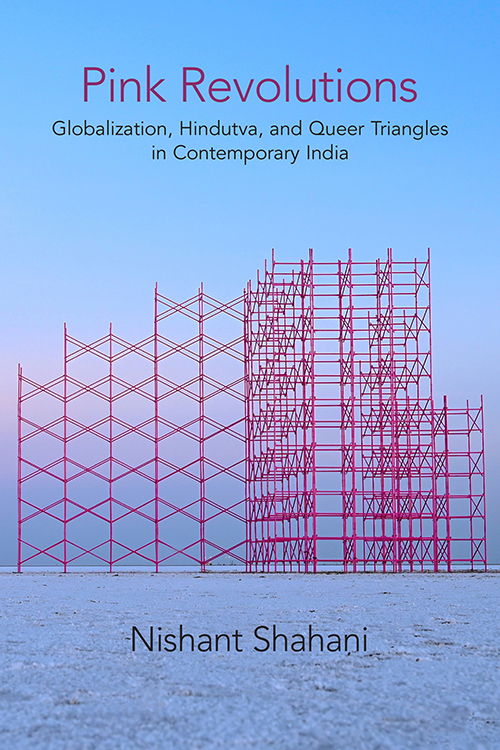

Critical Insurgencies
A Book Series of the Critical Ethnic Studies Association
Series Editors: Jodi A. Byrd and Michelle M. Wright
Critical Insurgencies features activists and scholars, as well as artists and other media makers, who forge new theoretical and political practices that unsettle the nation-state, neoliberalism, carcerality, settler colonialism, Western hegemony, legacies of slavery, colonial racial formations, gender binaries, and ableism, and challenge all forms of oppression and state violence through generative future imaginings.
About CESA The Critical Ethnic Studies Association organizes projects and programs that engage ethnic studies while reimagining its futures. Grounded in multiple activist formations within and outside institutional spaces, CESA aims to develop an approach to intellectual and political projects animated by the spirit of decolonial, antiracist, antisexist, and other global liberationist movements. These movements enabled the creation of ethnic studies and continue to inform its political and intellectual projects.
https://www.criticalethnicstudies.org
Nishant Shahani

Northwestern University Press
Evanston, Illinois
Northwestern University Press
https://www.nupress.northwestern.edu
Copyright 2021 by Northwestern University Press. Published 2021. All rights reserved.
Library of Congress Cataloging-in-Publication Data
Names: Shahani, Nishant, 1976 author.
Title: Pink revolutions : globalization, Hindutva, and queer triangles in contemporary India / Nishant Shahani.
Other titles: Critical insurgencies.
Description: Evanston, Illinois : Northwestern University Press, 2021. | Series: Critical insurgencies | Includes bibliographical references and index.
Identifiers: LCCN 2021000260 | ISBN 9780810143623 (paperback) | ISBN 9780810143630 (cloth) | ISBN 9780810143647 (ebook)
Subjects: LCSH: HomosexualityPolitical aspectsIndia. | HomosexualityReligious aspectsHinduism. | Gay liberation movementIndia.
Classification: LCC HQ76.8.I4 S53 2021 | DDC 306.7660954dc23
LC record available at https://lccn.loc.gov/2021000260
Cover image: Avantika Bawa, A Pink Scaffold in the Rann. A site-specific installation. Painted scaffolds, 40' 32' 45.5'. Gujarat, India, 20192020.
Cover design: Marianne Jankowski
A note to the reader: This e-book has been produced to offer maximum consistency across all supported e-readers. However, e-reading technologies vary, and text display can also change dramatically depending on user choices. Therefore, you occasionally may encounter small discrepancies from the print edition, especially with respect to indents, fonts, symbols, and line breaks. Furthermore, some features of the print edition, such as photographs, may be missing due to permissions restrictions.
Pink Revolutions begins and ends on notes of qualified caution, not the euphoria of political paradigm shifts that a title like pink revolutions might immediately invoke. When asked about this book, I am almost too quick to modify expectations and clarify that the revolution in the title does not signify glorious radical change or celebrations of progress (as important as those might be). I temper any anticipation that this book applauds benign queer visibility by stressing that it is actually about uneasy alliances, messy entanglements, and knotted triangulations. The book, after all, was completed under the aegis of the Modi and Trump regimeshardly an occasion for much political optimism and hopeful futures. At the same time, I am reminded of one of the (very useful) reviews of this book that gently suggested a less doggedly defensive tone in my writing, which has tended to be too steeped in paranoid hermeneutics, always anticipating and forestalling critique. While I might not have entirely succeeded at more reparative impulses given this books conceptual investments, perhaps these notes of thanks might be a good occasion to take a momentary turn away from default settings of anti-sociality.
I am extremely grateful to Gianna Francesca Mosser, former acquisitions editor at Northwestern University Press, for her enthusiastic interest and support of this project. Her comments on the book proposal and early drafts of a chapter were particularly invaluable in the nascent stages of the project. Many thanks to current acquisitions editor Trevor Perri, who took over from Gianna and carefully guided the project to its conclusion (in addition to responding to my various impatient queries). Much gratitude to the Critical Insurgencies series editors Michelle M. Wright and Jodi A. Byrd for their endorsement of the project. Many thanks to all the press staff at Northwestern University Press involved in the production and meticulous preparation of the manuscript: Anne Gendler, Patrick P. Samuel, JD Wilson, Olivia Aguilar, Anne Tappan Strother, and freelance copy editor Paul Mendelson. I am also very appreciative of the feedback from the two anonymous peer reviewers. Their comments were encouraging and supportive, but they also pushed for revisions that have made for a stronger book (particularly in the calls for a more capacious citational practice and an added attention to the epistemological implications of my arguments). Of course, the books inevitable gaps and flaws are entirely my own doing. I am very grateful to Avantika Bawa who generously agreed to my request to use of an image of her art installation, A Pink Scaffold in the Raan, for the book cover. The installation brilliantly captures the complicated knots, complex linkages, and messy triangles that I am theorizing throughout the book.
This book has greatly benefited from the valuable feedback I received at the Annual Conference on South Asia held at the University of WisconsinMadison, and especially at the Feminist Pre-Conference on Sexuality, Gender, and Sedition organized by Krupa Shandilya and Svati Shah in 2016. Thanks in particular to Geeta Patel, Anjali Arondekar, and Jyoti Puri for their critiques and questions which were provocative and useful. I am very grateful to Wakako Araki for inviting me to present a chapter of the book at the University of Niigatas Gender and Race Symposium in Japan and to workshop the books ideas with students and colleagues there. Putul Sathe at the Research Center for Womens Studies at SNDT Womens University in Mumbai, India, offered me an opportunity to discuss the books conclusion with students and scholars during my sabbatical year. Many thanks to the students at SNDT, who asked brilliant and complicated questions that forced me to engage with the books abstractions in concrete material contexts. I am greatly indebted to Shoba Ghosh, former chair of the English Department at the University of Mumbai, for her support over the years. A section of chapter 4 was based on research conducted at the Mani Bhavan library in Mumbai, where Usha Thakkar and the library staff were extremely kind and willing to help.
This book originated more than a decade ago in the latter stages of graduate school (but got put on the back burner due to my preoccupation with a different project that eventually became my first book). I owe much to my mentor and dissertation director in graduate school, Kim Emery, whose queer theory class remains a primal scene in my intellectual trajectory. At Washington State University (WSU), I am very grateful for the support of my chairs in the English Department, first Todd Butler and then Donna Potts, who have always been strong allies and advocates. From the year that I was hired as a junior assistant professor, my institutional base at WSU in the Department of Womens Studiesnow the Program in Womens, Gender, and Sexuality Studies (WGSS)has always been fraught with reshufflings and mergers due to the budget constraints that plague higher education. But in equal measure, this institutional precarity has much to do with the calcified histories of sexism and racism that are entrenched within university life, accompanied by a lack of political will to support feminist, antiracist, and queer work beyond the dull bromides of diversity and inclusion. The program has managed to survive under these institutional constraints in large part due to the vision and unrelenting labor of Pamela Thoma, director of the WGSS. I am also very appreciative of the support of my colleagues in WGSSMarian Sciachitano and writing group partner Linda Heidenreich. Thanks also to students past and present with whom I have shared so many stimulating conversations and from whom I have learned so much: Lizeth Gutierrez, Mary Jo Klinker, Veronica Sandoval, Leah Wilson, Ras Tanvir, and Heather Ramos. Thanks to Heather and Nazua Idris for their assistantship with sending me research materials when I was working on this project in India.
Next pageFont size:
Interval:
Bookmark:
Similar books «Pink Revolutions: Globalization, Hindutva, and Queer Triangles in Contemporary India»
Look at similar books to Pink Revolutions: Globalization, Hindutva, and Queer Triangles in Contemporary India. We have selected literature similar in name and meaning in the hope of providing readers with more options to find new, interesting, not yet read works.
Discussion, reviews of the book Pink Revolutions: Globalization, Hindutva, and Queer Triangles in Contemporary India and just readers' own opinions. Leave your comments, write what you think about the work, its meaning or the main characters. Specify what exactly you liked and what you didn't like, and why you think so.


